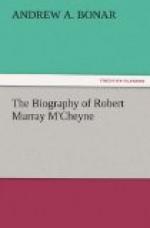[11] “Gration est pulchro veniens e corpore virtus.”
He went about his public work with awful reverence. So evident was this, that I remember a countryman in my parish observed to me: “Before he opened his lips, as he came along the passage, there was something about him that sorely affected me.” In the vestry there was never any idle conversation; all was preparation of heart in approaching God; and a short prayer preceded his entering the pulpit. Surely in going forth to speak for God, a man may well be overawed! Surely in putting forth his hand to sow the seed of the kingdom, a man may even tremble! And surely we should aim at nothing less than to pour forth the truth upon our people through the channel of our own living and deeply affected souls.
After announcing the subject of his discourse, he used generally to show the position it occupied in the context, and then proceed to bring out the doctrines of the text, in the manner of our old divines. This done, he divided his subject; and herein he was eminently skilful. “The heads of his sermons,” said a friend, “were not the mile-stones that tell you how near you are to your journey’s end, but they were nails which fixed and fastened all he said. Divisions are often dry; but not so his divisions,—they were so textual and so feeling, and they brought out the spirit of a passage so surprisingly.”
It was his wish to arrive nearer at the primitive mode of expounding Scripture in his sermons. Hence when one asked him, If he was never afraid of running short of sermons some day? he replied, “No; I am just an interpreter of Scripture in my sermons; and when the Bible runs dry, then I shall.” And in the same spirit he carefully avoided the too common mode of accommodating texts,—fastening a doctrine on the words, not drawing it from the obvious connection of the passage. He endeavored at all times to preach the mind of the Spirit in a passage; for he feared that to do otherwise would be to grieve the Spirit who had written it. Interpretation was thus a solemn matter to him. And yet, adhering scrupulously to this sure principle, he felt himself in no way restrained from using, for every day’s necessities, all parts of the Old Testament as much as the New. His manner was first to ascertain the primary sense and application, and so proceed to handle it for present use. Thus, on Isaiah 26:16-19, he began: “This passage, I believe, refers literally to the conversion of God’s ancient people.” He regarded the prophecies as history yet to be, and drew lessons from them accordingly as he would have done from the past. Every spiritual gift being in the hands of Jesus, if he found Moses or Paul in the possession of precious things, he forthwith was led to follow them into the presence of that same Lord who gave them all their grace.




